| Srl | Item |
| 1 |
ID:
065948
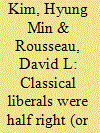

|
|
|
| 2 |
ID:
112375
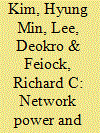

|
|
|
|
|
| Publication |
2012.
|
| Summary/Abstract |
This study argues that a state's power is best conceptualized by considering how a state interacts with all other states in different networks within the international system. This social network explanation for national power is applied to militarized conflicts, one of the most widely studied empirical phenomena in international relations, focusing on their power explanations. The empirical analysis of militarized conflicts at the dyadic level produces findings that strongly support power preponderance theory over balance of power theory. The evidence from nonparametric model discrimination statistics and information criteria measures also shows that our conflict models with new social network power measures have greater explanatory power than or statistically outperform models relying on attributional power measures, such as Correlates of War index and Gross National Product (GNP).
|
|
|
|
|
|
|
|
|
|
|
|
|
|
|
|
| 3 |
ID:
117690
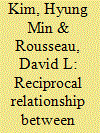

|
|
|
|
|
| Publication |
2013.
|
| Summary/Abstract |
Does democracy cause peace, or is democracy a consequence of peace? The burgeoning democratic peace literature has provided strong empirical evidence for the claim that democracies are a cause of peace. However, several skeptics of the democratic peace have suggested that the statistical findings are spurious. We test these competing claims using a simultaneous equation model. Using a unique data-set of all international disputes from 1960 to 1988, we find strong support for reciprocal causation. As the democratic peace theorists claim, democracy causes peace even after controlling for military conflict in the system and region. Conversely, peace in the region appears to encourage the development of democratic polities.
|
|
|
|
|
|
|
|
|
|
|
|
|
|
|
|
| 4 |
ID:
172780
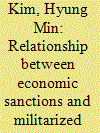

|
|
|
|
|
| Summary/Abstract |
This research empirically examines the relationship between economic sanctions and militarized conflicts for the period 1945–2001. The collective security principles of the League of Nations (after WWI) and the United Nations (after WWII) are based on the sequential imposition of economic and militarized sanctions against states that violate international rules and regulations. A recent example is the international sanctions imposed on North Korea in response to its nuclear weapons testing and ballistic missile development. Theoretical arguments in the field of international relations suggest that economic sanctions lead to militarized tensions and conflicts among states. In this research, we argue that the relationship between economic sanctions and military conflict is two-way (i.e. sanctions cause conflict, and conflict causes sanctions) rather than one-way. Using sanctions data (Threat and Imposition of Sanctions v4.0) and conflict data (Correlates of War Militarized Interstate Disputes v4.2; International Crisis Behavior v12), we find that the relationship is mutually causative. The involvement of economic sanctions causes the onset of militarized conflict, and vice versa.
|
|
|
|
|
|
|
|
|
|
|
|
|
|
|
|
| 5 |
ID:
174829
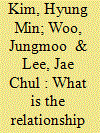

|
|
|
|
|
| Summary/Abstract |
Despite the importance of alliances in international politics, little is known about how they theoretically and empirically affect militarized conflicts and vice versa. This study aims to examine the reciprocal relationship between alliances and militarized conflicts. The literature has focused only on the effects of alliances on militarized conflicts without paying much attention to the simultaneous causation between them. Thus, previous studies have not consistently revealed a relationship between alliances and conflict. Moreover, they are limited due to the use of dichotomous measures of shared alliance ties. Using a continuous measure of alliance ties, this study clearly demonstrates that shared alliance ties can be effective in reducing the likelihood of militarized conflicts. In addition, this study finds that there is a reciprocal relationship between shared alliances and militarized conflicts. It finds that militarized conflicts tend to decrease the level of shared alliance ties. Then, this study argues that alliance might be added to the next element behind the Kantian tripod as a salient factor that reduces militarized conflict. Finally, this study points to insights to be gained from the findings and suggests some policy implications.
|
|
|
|
|
|
|
|
|
|
|
|
|
|
|
|